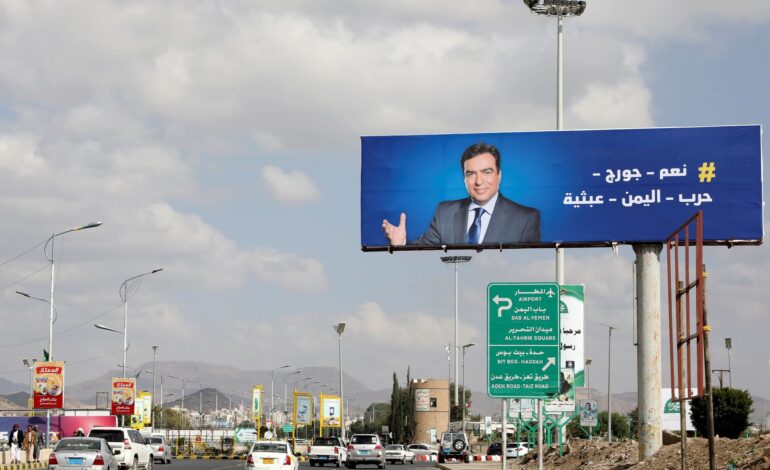Lebanon is facing its worst rift yet with oil-rich Gulf Arab states, spurred by comments made by Lebanese Information Minister George Kordahi before his official appointment about the Saudi-led campaign that has created a severe humanitarian crisis in Yemen.
Lebanese Prime Minister Najib Mikati said on Thursday he had agreed with President Michel Aoun on a “road map” to solve the diplomatic row with Saudi Arabia and other Gulf countries, but did not give details.
Mikati urged Kordahi to put national interests first, but stopped short of asking him to resign, as he struggles for a way out of the diplomatic crisis.
In an interview he said was recorded on Aug. 5, Kordahi said Yemen was subjected to aggression and that Houthis were defending themselves. Saudi Arabia and some Gulf Arab allies reacted angrily to the remarks.
The rift ignited by Kordahi’s remarks criticizing Saudi Arabia over the Yemen war has added to the problems facing Mikati and his government, which was already paralyzed by an inner conflict over the probe into last year’s Beirut port explosion.
Barely two months since the government was agreed upon following a year of political conflict, the tensions have complicated Mikati’s attempts to begin addressing Lebanon’s most pressing problem — its catastrophic economic collapse.
In a speech, Mikati said there would be “decisive meetings” ahead to resolve issues facing the government.
But he gave no indication that solutions were in sight.
Saudi Arabia and two other Gulf states expelled the Lebanese envoys in their capitals in response to Kordahi’s comments, which were recorded before he took office but aired last week. The United Arab Emirates withdrew its diplomats from Beirut.
Saudi Arabia’s ties with Lebanon have been strained for years by the growing role of the Hezbollah group and Riyadh has said Kordahi’s comments were a symptom of its dominance.
Mikati said the comments had presented the government with a difficult challenge and urged Kordahi to “prioritize national interest.”
“I repeat calls for the information minister to listen to his conscience and take circumstances into consideration and take the stance he should take,” Mikati said.
Speaking to al-Mayadeen TV, Kordahi again said he would not quit.
Hezbollah has expressed support for Kordahi and described the Saudi step as an act of aggression against Lebanon.
Hezbollah deputy leader Sheikh Naim Kassem, in an interview with a Syrian broadcaster, linked the Saudi move to Houthi advances in Yemen and the “resounding loss” he said Riyadh faced there. Saudi Arabia wanted to divert attention by putting pressure on Lebanon, he said.
Kordahi has said his remarks were personal views made before he was a minister and that he is committed to government policy. Mikati has said the comments had nothing to do with his government, which wants good ties with Arab states.
The government has not met since Oct. 12 because of a dispute over the probe into the port explosion. Hezbollah is also involved in that row, demanding the removal of the lead investigator, whom it accuses of bias.
Indicating no resolution to that standoff, Mikati said the cabinet would not intervene in judicial matters.
“Anyone who thinks they can impose their opinion by impeding work and verbal escalation is wrong,” he said in an apparent swipe at Hezbollah.
— Wire and staff






Leave a Reply